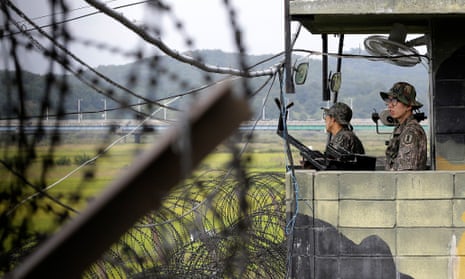South Korea must immediately release hundreds of men who have been imprisoned for draft-dodging, Amnesty International has said in a report published on Wednesday.
In its report, Sentenced to Life, the human rights organisation said 600 young South Korean conscientious objectors had been unfairly labelled as criminals and faced “harsh consequences” after their release from prison for refusing to perform national service on political or religious grounds.
Campaigners say the men face abuse and discrimination after their release. Many objectors find it hard to secure jobs and are regarded by wider South Korean society as unpatriotic for their refusal to help defend the country amid continuing tensions with North Korea.
Some objectors say their actions practically ended their marriage prospects and caused deep divisions within their families.
Lee Yeda, 24, said he had suffered a “social death” for refusing to join South Korea’s 650,000-strong military. He avoided prison by becoming the first South Korean objector to win refugee status in France in 2012, two months before he was due to begin military service.
But his decision damaged his relationship with his mother. “My father and younger sister were not in favour of the idea but they left the choice up to me and refused to interfere,” Lee said. “It was my mother who had a strong reaction. She questioned me, ‘Why are you are not going to the military like everyone else? Why do you want to be a victim?’ She was even more shocked when I told my decision to apply for refugee status and told me to go to prison instead.”
Most of those who refuse to perform national service – a legal requirement for the past 50 years for all South Korean men aged 18 to 35 – serve 18 months in prison but, according to Amnesty, “face economic and social disadvantages which last far beyond” their jail terms.
“For the South Korean government to condemn innocent young men as criminals is a scandal and a violation of their rights,” said Hiroka Shoji, East Asia researcher at Amnesty International. “The jailing of conscientious objectors does not make South Korea any safer. It only serves to stigmatise and crush the aspirations of young men who had bright futures.”
Amnesty said South Korea’s treatment of conscientious objectors violated international law. The country jails more conscientious objectors than the rest of the world put together, it said, adding that at least 600 men, mostly aged 20 to 24, are serving prison sentences.
“The government is failing these young men, their families and society,” Shoji added. “There are genuine alternatives to military service that the authorities can and must provide. These men are prisoners of conscience and must be immediately and unconditionally released.”
South Korean authorities insist that national service, which typically lasts 21 months to two years, must remain in place while the country faces a military threat from North Korea. Once they complete their national service, men are required to serve in the reserve forces for a further eight years, serving a maximum of 160 hours a year.
Exceptions are sometimes made for internationally successful athletes, but actors and singers are expected to serve, sometimes at the height of their careers. Recent draftees include two members of the hugely popular K-pop boyband Super Junior.
Those who refuse conscription face up to three years in prison, and heavy fines for refusing their duties as reservists.
The long list of conscientious objectors includes a large number of men whose religious faith prevents them from taking up arms. Song In-ho, a 25-year-old college graduate, is awaiting a court ruling on his refusal to perform national service. Song, a Jehovah’s Witness, said he had always known he would one day be incarcerated for his religious beliefs.
“I was born as a criminal,” he said. “All my life I felt like I was imprisoned because I knew that I would be sent to jail. I was a future criminal.”
Kim Sung-min, a pacifist and Christian who is serving an 18-month sentence at a detention centre in Seoul, said his father had opposed his decision to reject militarism. “My heart was broken,” Kim said, “But I felt that my father’s thoughts were typical among Koreans.”
Another objector, Lee Cherin, said he wanted to serve his country in a non-violent way. “I am willing to serve [my] country,” Lee, 24, said. “I would like others to understand that the reason I refuse to take up arms is genuine, and not done out of negligence.”
South Korea’s defence ministry said in 2007 it would devise alternatives to national service, but the idea was abandoned the following year after the the election as president of Lee Myung-bak, a conservative who ended the country’s “Sunshine” policy of rapprochement towards North Korea. Lee’s successor, Park Geun-hye, has taken a similarly hard line towards Pyongyang.
